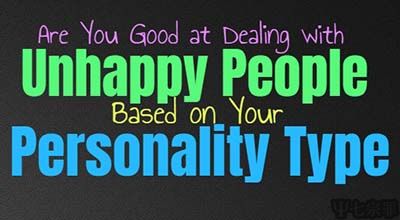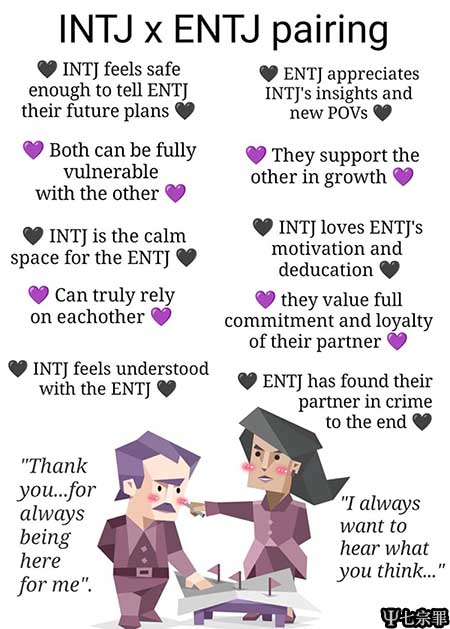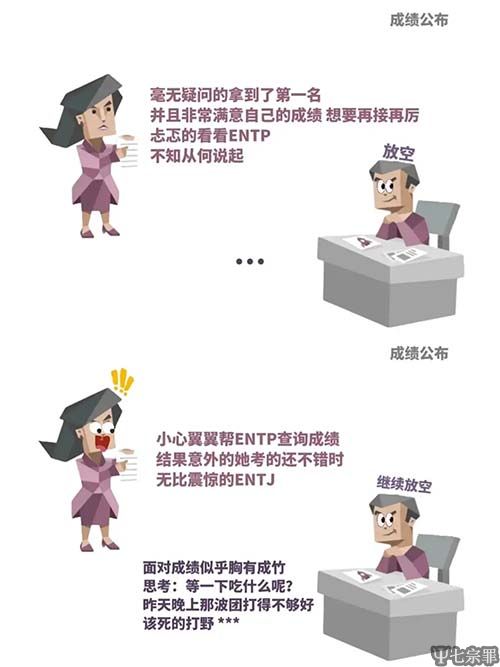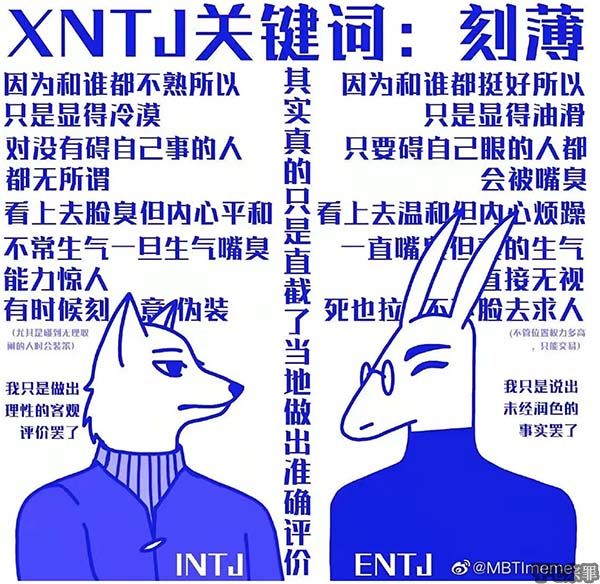真正的管理者是管理人的情绪。
顾修全
所以还是快乐点好,谁愿意和低情绪的人长时间呆着…
We often have to deal with others who are grumpy or just unhappy, and this is something not everyone is good at doing. Sometimes the emotions of others can be too overwhelming, or it can leave them feeling frustrated themselves because they fear they cannot help. Here is how you deal with unhappy people, based on your personality type.
根据你的性格类型,你擅长与不快乐/低情绪的人打交道吗?
我们经常不得不与脾气暴躁或不开心的人打交道,而这并不是每个人都擅长的事情。
有时,他人的情绪可能过于强烈,或者可能让他们自己感到沮丧,因为他们害怕自己无能为力。

以下是根据MBTI性格类型,与不快乐的人的处理方法。
INFJ
INFJs often understand that people can’t be happy all of the time and so they try to be understanding. They usually show their support by simply listening and being there for someone who is feeling down or struggle. When INFJs have a hard time being around unhappy people, is when this backfires and ends up leading these people to hurting others. INFJs have a hard time being around people who constantly allow their own pain to hurt others around them, especially since they are empathetic and caring people. They try their best to help, but sometimes this can drain the INFJ and leave them feeling unhappy as well.
INFJs 经常理解人们不可能一直快乐,所以他们试图理解这种情形。
他们通常通过简单地倾听并陪伴感到沮丧或挣扎的人来表达他们的支持。
当 INFJ 很难与不快乐的人相处时,就会适得其反,最终导致这些人伤害他人。
INFJ 很难与那些经常让自己的痛苦伤害周围的人的人相处,尤其是因为他们是善解人意和有爱心的人。
他们尽最大努力提供帮助,但有时这会耗尽 INFJ 并让他们感到不快乐。
ENFJ
ENFJs can actually have a hard time being around unhappy people, since their instinct is to fix this. They dislike seeking people in pain and so they want to find a solution to this. When they are around unhappy people the ENFJ can often feel and sense this, sometimes even so much so that it overtakes their own emotions. ENFJs have this powerful sense of empathy and so being around unhappy people can actually be exhausting for them after a while. They often try to help, but when they cannot make things better it takes a toll on the ENFJ.
ENFJ 实际上很难与不快乐的人相处,因为他们的本能就是要解决这个问题。
他们不喜欢寻找痛苦的人,因此他们想找到解决办法。
当他们在不快乐的人身边时,ENFJ 经常能感觉到和察觉到这一点,有时甚至会超过他们自己的情绪。
ENFJ 具有这种强烈的同理心,因此在不快乐的人身边经过一段时间实际上会让他们筋疲力尽。他们经常试图提供帮助,但当他们无法让事情变得更好时,就会对 ENFJ 造成伤害。
INFP
INFPs often do their best to deal with unhappy people without becoming bothered by it. They understand that people cannot control their emotions and personally dislike when someone tries to force them to do the same. INFPs want to give others a chance to be themselves and express their emotions without feeling judged for it. INFPs can often deal with unhappy people by just letting them feel this way and not trying to change them. INFPs only have a hard time with unhappy people when it is their job to try and solve their problems or make this person happy, like in a customer service job.
INFP 经常尽最大努力与不快乐的人打交道,而不会被它打扰。
他们明白,当有人试图强迫他们做同样的事情时,人们无法控制自己的情绪并且从个人角度来说很不喜欢。
INFP 想要给别人一个做自己的机会,并表达自己的情绪,而不会感到被评判。
INFP通常可以通过让他们有这种感觉而不是试图改变他们来处理不快乐的人。
只有当他们的工作是试图解决他们的问题或让这个人开心时,INFP 才会很难与不开心的人相处,比如在客户服务工作中。
ENFP
ENFPs can often handle being around unhappy people for short times, but after a while this can be draining for them. They need to be around positivity in order to thrive and continue moving forward. ENFPs believe in growth and don’t like feeling stagnant, sometimes being around unhappy people can leave them feeling a bit trapped in their current situation. For the ENFP it is best to be around others who want the same things and who inspire them to progress and open themselves up to change.
ENFP通常可以在短时间内处理不快乐的人,但过了一段时间,这可能会让他们筋疲力尽。
他们需要积极向上才能茁壮成长并继续前进。
ENFP 相信成长,不喜欢停滞不前,有时和不开心的人在一起会让他们感觉有点困在当前的处境中。
对于 ENFP 来说,最好是和其他想要相同事物并激励他们进步并敞开心扉接受改变的人在一起。
INTJ
INTJs don’t really like dealing with unhappy people who are constantly expecting them to change their situation. INTJs are problem solvers, but emotions are something they struggle to really deal with most of the time. They just don’t like having to try and help someone who is being emotional and not using their minds to make themselves happier. INTJs focus on getting things done and accomplishing their goals, knowledge is often the thing which makes them happy. For the INTJ unhappy people can be exhausting, since they are often needy and demanding.
INTJ 并不喜欢与‘不断期待他们改变现状的不快乐的人’打交道。
INTJ 是问题解决者,但情绪是他们大部分时间都纠结且难以真正处理的事情。
他们只是不喜欢不得不尝试帮助那些,处于情绪化中而不是用他们的思想来让自己更快乐的人。
INTJ 专注于完成工作并实现他们的目标,知识往往是让他们快乐的东西。
对于 INTJ 来说,不快乐的人可能会让人筋疲力尽,因为这些人经常需要帮助并且要求很高。
ENTJ
ENTJs don’t really know how to respond to unhappy people, since they are problem solvers but not when it comes to emotions. They often do their best to try and fix the situation but when someone is being overly emotional they don’t always know how to respond. These situations can be deeply draining for the ENTJ, who really just wants to focus on being efficient and tending to the more practical needs of those around them.
ENTJ 真的不知道如何回应不快乐的人,因为他们是解决问题的人,但在情绪方面却不是。
他们经常尽最大努力尝试解决问题,但是当某人过于情绪化时,他们并不总是知道如何回应。
对于 ENTJ 来说,这些情况可能会让他们筋疲力尽,他们真的只想专注于提高效率并满足周围人更实际的需求。
INTP
INTPs often understand allowing people to just feel a certain way, but sometimes being around unhappy people can be draining for them. They don’t always understand why this is happening, or why it making them feel so uneasy. INTPs can sometimes be dragged down by these unhappy people, and really just want a sense of space from them. They especially dislike unhappy people who are using only emotions and no logic. INTPs can often solve problems, but emotional ones become truly trying for them.
INTP通常理解允许人们只是在用另一种方式感受,但有时和不快乐的人在一起会让他们筋疲力尽。
他们并不总是明白为什么会发生这种情况,或者为什么这让他们感到如此不安。
INTP 有时会被这些不开心的人拖垮,真的只是想从他们身上获得空间感。他们特别不喜欢只使用情绪而不使用逻辑的不快乐的人。
intp通常可以解决问题,但情绪化的问题对他们来说是真正的考验。
ENTP
ENTPs don’t want to allow unhappy people to bring them down, especially in a customer service setting. When they are around people who are unhappy and demanding, the ENTP does their best not to let these feelings overwhelm them personally. They prefer to have a sense of space from these people, probably wanting to do their own thing away from this negativity. ENTPs can appreciate being unhappy for certain reasons and will do their best to be comforting when it is someone they love. It just doesn’t always come naturally for them to really know how to respond to emotional outbursts.
ENTP 不想让不开心的人让他们情绪低落,尤其是在客户服务环境中。
当他们周围的人不快乐和要求很高时,ENTP 会尽力不让这些感觉压倒他们个人。
他们更喜欢从这些人那里获得一种空间感,可能想要做自己的事情来摆脱这种消极情绪。
ENTP 可以欣赏由于某些原因而感到不开心,并且当遇到他们所爱的人时会尽力安慰。
他们并不总是自然而然地真正知道如何应对情绪爆发。
ISTJ
ISTJs don’t really like handling unhappy people, since they try to keep emotions out of their work. When they are trying to get something done they want it to be logical and efficient. If they are in a setting where someone has a problem and they are simply being emotional and unhappy, it becomes exhausting for the ISTJ. When it comes to their personal lives they try to be as understand as they can when it comes to people being unhappy, but this can still be challenging since they don’t really know how to solve these issues.
ISTJ 并不喜欢与不开心的人打交道,因为他们试图将情绪排除在工作之外。
当他们试图完成某件事时,他们希望它是合乎逻辑和高效的。
如果他们处于某人有问题的环境中并且他们只是情绪化和不快乐,那么对于 ISTJ 来说就会变得筋疲力尽。
当涉及到他们的个人生活时,他们会尽量理解人们不快乐的情况,但这仍然具有挑战性,因为他们并不真正知道如何解决这些问题。
ESTJ
For the ESTJ dealing with unhappy people often depends on what is making them unhappy and if the problem can be solved. If these people are simply unhappy and emotions, then it becomes challenging for the ESTJ to really know how to respond. When the person is unhappy for more practical reasons, then the ESTJ is capable of responding to and handling this with ease. They are good at problem solving, as long as they can focus on fixing a practical problem.
对于 ESTJ 来说,与不快乐的人打交道通常取决于是什么让他们不快乐,以及问题是否可以解决。
如果这些人只是不开心和情绪激动,那么 ESTJ 很难真正知道如何回应。
当这个人因为更实际的原因不开心时,ESTJ 能够轻松应对和处理。
他们擅长解决问题,只要他们能专注于解决实际问题。
ISFJ
ISFJs can be a bit overwhelmed by unhappy people, since they want to find a way to make them feel better. They can sense the emotions of others, especially the people they care for. ISFJs want to be able to help and make this person happy again, and will often go out of their way to do this. After a while it can become draining though, especially if the person seems like they cannot be helped or are going to be unhappy no matter what.
ISFJ 可能会对不快乐的人感到不知所措,因为他们想找到一种方法让他们感觉更好。
他们可以感知他人的情绪,尤其是他们关心的人。ISFJs 希望能够帮助这个人并让这个人再次快乐,并且经常会不遗余力地做到这一点。
一段时间后,它可能会变得筋疲力尽,特别是如果这个人似乎无法得到帮助或无论如何都会不开心。
ESFJ
ESFJs truly care about others and often work hard to make them happy. When someone around them is unhappy the ESFJ senses this and wants to find a way to make things better. It can be difficult for them to handle this type of situation when it seems a person is going to be unhappy no matter what. This puts a lot of pressure on the ESFJ, who really wants to please everyone and find a way to make their loved ones as happy as possible.
ESFJ 真正关心他人,并经常努力让他们快乐。
当他们周围的人不开心时,ESFJ 会感觉到这一点,并想找到一种让事情变得更好的方法。
当一个人似乎无论如何都会不开心时,他们可能很难处理这种情况。
这给 ESFJ 带来了很大的压力,他们真的很想取悦每个人,想办法让他们所爱的人尽可能快乐。
ISTP
Unhappy people rarely bother the ISTP all that much, since they don’t take responsibility for their happiness. If they are in a job where they must aid these unhappy people, they simply focus on the facts and don’t want to let emotions get in the way. While ISTPs can be good at this, they also become a bit drained with it after a while. Dealing with people constantly can be exhausting, especially if these people are emotional and constantly unhappy.
不快乐的人很少打扰 ISTP,因为他们不为自己的快乐负责。
如果他们从事的工作必须帮助这些不快乐的人,他们只会关注事实,不想让情绪妨碍他们。
虽然 ISTP 可以擅长这一点,但他们也会在一段时间后变得有点筋疲力尽。不断地与人打交道可能会让人筋疲力尽,尤其是当这些人情绪激动且不断不开心时。
ESTP
ESTPs often try to avoid unhappy people, not wanting to allow their negative to become a drain. They focus on doing their own thing in life and are naturally independent people. When the ESTP cares for someone they do want to be supportive, but sometimes being around unhappy people can leave them feeling drained and unhappy themselves. They will likely try to find a way to fix this by changing the mood and searching for something fun to do.
ESTP 经常试图避开不快乐的人,不想让他们的负面情绪成为一种消耗。
他们在生活中专注于做自己的事情,是天生独立的人。
当 ESTP 关心某人时,他们确实想给予支持,但有时与不快乐的人在一起会让他们感到筋疲力尽和不快乐。
他们可能会尝试通过改变心情和寻找有趣的事情来找到解决此问题的方法。
ISFP
ISFPs do their best to respect the emotions of others and don’t want to try and change someone who is unhappy. ISFPs believe in being free to be open about their emotions, not wanting to hold back or pretend for the sake of someone else. If the ISFP is unhappy they want to be free to feel this way, and so they also want to give others this same courtesy. When a person is unhappy the ISFP often tries to be supportive, or give them the space they need.
ISFP 尽最大努力尊重他人的情绪,不想试图改变不快乐的人。
ISFP 相信可以自由地公开自己的情绪,不想为了别人而退缩或假装。
如果 ISFP 不开心,他们想要自由地感受这种方式,因此他们也想给予他人同样的礼貌。
当一个人不开心时,ISFP 经常试图给予支持,或者给他们所需的空间。
ESFP
ESFPs can become drained around unhappy people, especially if this person continues to be this way. They might try and lighten the mood, finding ways to improve the situation and make the person who is unhappy, get excited about something else. ESFPs want to remain positive and so being around those who are constantly miserable, can leave them feeling a bit trapped. ESFPs might avoid these people, unless it is someone they love and in this case they try to make them ignore these unhappy emotions.
ESFP 可能会在不快乐的人身边变得精疲力竭,尤其是如果这个人继续这样。
他们可能会尝试缓和情绪,找到改善情况的方法,让不快乐的人对其他事情感到兴奋。
ESFP 想要保持积极的态度,因此与那些不断痛苦的人在一起会让他们感到有点被困。
ESFP 可能会避开这些人,除非是他们爱的人,在这种情况下,他们会试图让他们忽略这些不愉快的情绪。
所以,还是快乐点吧,没有多少人愿意为你的低落买单!!!
 七宗罪心理
七宗罪心理













